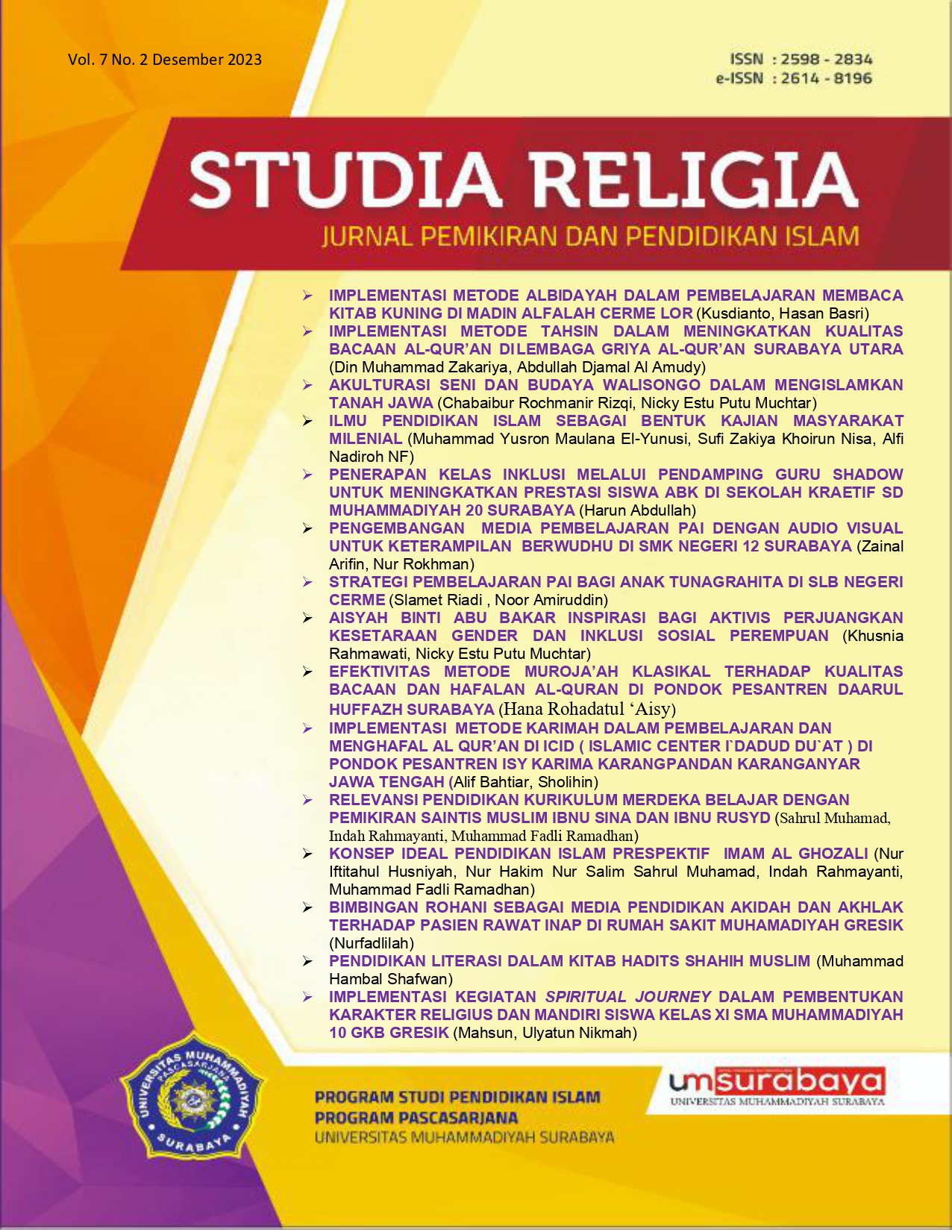IMPLEMENTASI METODE ALBIDAYAH DALAM PEMBELAJARAN MEMBACA KITAB KUNING DI MADIN ALFALAH CERME LOR
DOI:
https://doi.org/10.30651/sr.v7i2.20516Abstract
This research aims to determine the methods used in Nahwu Shorof learning and also the supporting and inhibiting factors in the Nahwu Shorof learning process at MADIN Alfalah in Cerme Lor Cerme Gresik Village. By carrying out this research, it is hoped that it can increase knowledge and provide benefits for those involved in the NahwuShorof learning process in general, especially for MADIN Alfalah itself as the location where this research was conducted.
The research method used is qualitative descriptive research. Data collection uses observation, interviews and documentation methods. Data analysis is carried out by giving meaning to the data obtained and then drawing conclusions.
The results of the research show that (1) The learning resource (book) used in learning nahwu shorof at MADIN Alfalah is the Albidayah Method Book. (2) The learning method for the science of nahwu shorof at MADIN Alfalah uses the Al-hifdhu, Al-fahmu, and Al-tathbiq methods.
Apart from learning activities in class which are a supporting factor in the nahwu shorof learning process, the MADIN Alfalah teachers often hold competition activities in the art of reading and writing the Koran, reading the bald book, speeches, and so on. Meanwhile, inhibiting factors include students' varying levels of intelligence, as well as limited learning time.
References
Abdullah, Muhammad. “Problematika Dan Krisis Pendidikan Islam Masa Kini Dan Masa Yang Akan Datang.” AL-URWATUL WUTSQA: Kajian Pendidikan Islam 2, no. 1 (2022): 66–75.
Fauzan, Irfan, and Muslimin. “Efektifitas Metode Sorogan Dalam Meningkatkan Minat Belajar Santri….” Jurnal Intelektual: Jurnal Pendidikan dan Studi Keislaman 8, no. 1 (2018): 69–80.
Hasan, Nur. “Model Pembelajaran Berbasis Pondok Pesantren Dalam Membentuk Karakter Siswa Di Pondok Pesantren Raoudhotut Tholibin Rembang Jawa Tengah.” Wahana Akademika: Jurnal Studi Islam dan Sosial 3, no. 2 (2016): 92.
Indra, Hasbi. “Taman Pendidikan Al-Qur’an Berbasis Pendidikan Manusia.” Risâlah, Jurnal Pendidikan dan Studi Islam 6, no. 1 (2020): 150–164.
Izzan, Ahmad. Metodologi Pembelajaran Bahasa Arab. Bandung: Humaniora, 2019.
Moleong, Lexy J. Metodologi Penelitian Kualitatif. Bandung: Rosda, 2017.
Mu’ammar, M. Arfan. “Pesantren Dan Islam Puritan: Pelembagaan Tajdid Keagamaan Di Lembaga Pendidikan Islam.” Tsaqafah 11, no. 2 (2015): 273.
Shafwan, Muhammad Hambal. “Analisis Model Pendidikan Tauhid Di Pesantren Al-Ikhlash Lamongan, Indonesia.” Tsaqafah 17, no. 1 (2021): 141–160. https://ejournal.unida.gontor.ac.id/index.php/tsaqafah/article/view/6662.
———. “‘DERESAN’ PROGRAM THE MASTERY OF ARABIC-CLASSIC BOOK AT PONDOK PESANTREN KARANGASEM LAMONGAN EAST JAVA INDONESIA.” Journal of Social Sciences and Humanities, AIS (American Institute of Science) 01, no. 02 (2015): 125–130. http://files.aiscience.org/journal/article/html/70320030.html.
———. “IMPLEMENTASI METODE PEMBELAJARAN ILMU BAHASA ARAB BAGI PEMULA BERBASIS KITAB DL 1 MENGGUNAKAN MODUL BELAJAR BERPOLA DEEP Q&A SEBAGAI UPAYA UPGRADING HASIL BELAJAR SANTRI DI PESANTREN MAHASISWA THAYBAH SURABAYA.” STAIKA 5, no. 2 (2022): 172–282. https://jurnal.staim-paciran.ac.id/index.php/staika/article/view/60.
Siswati, Vialinda. “Pesantren Terpadu Sebagai Solusi Problematika Pendidikan Agama Islam Di Era Globalisasi.” Jurnal Pendidikan Islam Indonesia 2, no. 2 (2018): 123–138.
Downloads
Published
Issue
Section
License
Copyright (c) 2023 kusdianto, Hasan Basri

This work is licensed under a Creative Commons Attribution-NonCommercial 4.0 International License.
Penulis tetap memegang hak atas karyanya dan memberikan hak publikasi pertama kepada jurnal ini yang secara simultan karya tersebut dilisensikan di bawah:
Creative Commons Attribution-NonCommercial 4.0 International License









